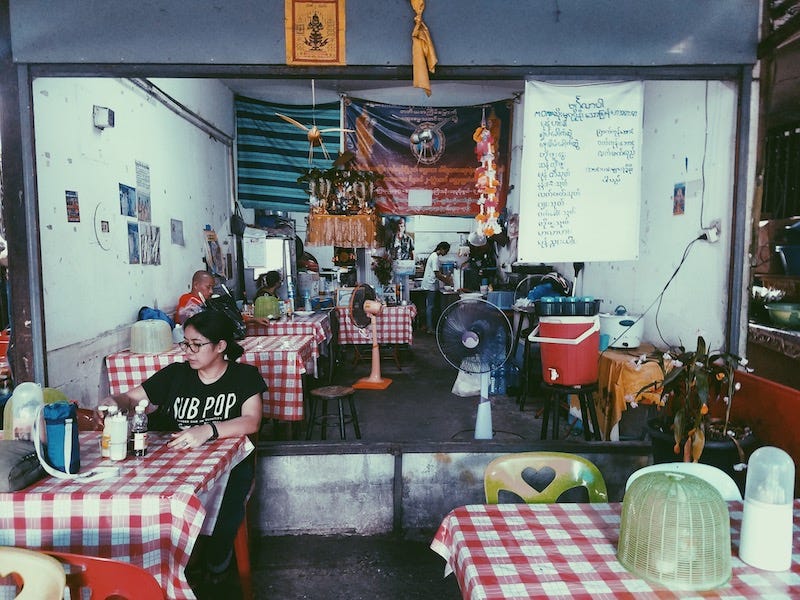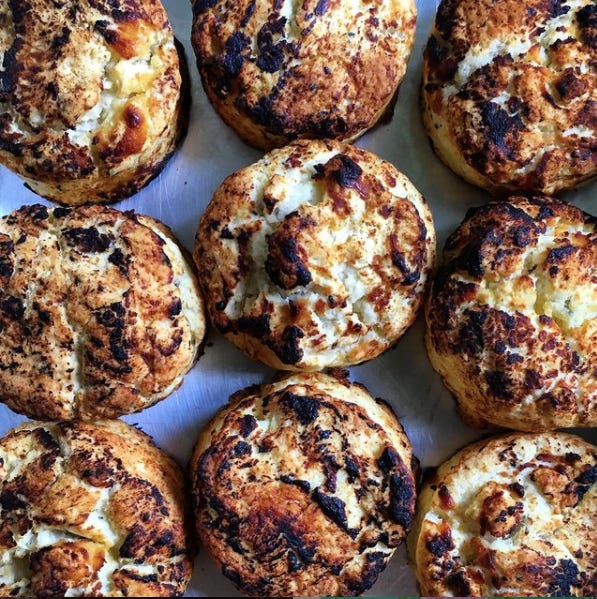Q&A with Po's Bong Sta. Maria
On being a former picky eater, her thoughts on last year's food media reckonings, and her love-hate relationship with her most popular cake
Bong Sta. Maria is one-half of the culinary dream team that is Po, purveyor of Manila’s tastiest pork buns and noodles. With her partner Jake Caruncho, the pair has been feeding the metro’s hungry masses for almost six years. Last year, they launched Po Bakery, with Bong at the helm, at a time when most businesses were struggling to make ends meet. Turns out, the people, especially Manila’s frontliners, needed sugar.
“I noticed that I have a lot of doctor clients. One time, one of them even told me they needed to eat my cakes,” Bong says. That many resorted to eating their feelings amid the Phillipine government’s repeated failure to support the medical community in dealing with the pandemic makes a lot of sense.
I caught up with Bong recently as she was starting a much-needed break from running Po to talk about how the pandemic’s affected the business, her decision to start Po Bakery, her wildly popular tres leches cake, and her thoughts on the food people we both once idolized.
When did you realize you wanted to pursue a career in food?
It was on the New York trip we took in 2014. We spent a few weeks there, we had a list [of places to go]: Momofuku, Baohaus, Mission, because of Lucky Peach. We used the magazine as a guide. We just spent weeks eating. We didn’t have plans but I remember talking to Jake after we’d returned. I said to him, “Why don’t we sell buns?” We didn’t really put much thought into it, we just started cooking.
So prior to that you were just experimenting in the kitchen?
Well, I’d been baking since high school. Cookies, the usual pastries. I always thought it was just gonna be a hobby. The serious baking came much later.
Were you always interested in food?
I enjoyed eating, in general, but it was very limited because growing up I was a picky eater, so I only enjoyed the safe things, like cheese and chocolate, fruit. I wasn’t into the more serious stuff. I liked chicken nuggets and hotdogs. I refused to eat condiments. No ketchup, no mustard, no mayo. I grew up eating and loving my mama's dishes, the usual Filipino/Spanish fare like adobo, torta, afritada.
My family would go out every Sunday, so that was my exposure to different kinds of foods. That’s where it probably started and what sparked my interest, eating out. But in general, I wasn’t very adventurous. Until now, you can’t make me eat liver. I like pâté, I like it in other forms but I never grew out of that.
My constant has always been cake. In college, before going home, I would go to a café and study with coffee and a slice of cake. It was always the best part of my day.
How did you make the decision to go into baking and start Po Bakery, which feels like a big but natural pivot from Po?
I wasn’t really planning on it. In 2019, I took pastry courses, I think I talked to you about this, at The Academy of Pastry and Bakery Arts. So I enrolled, cos I had extra money. It wasn’t cheap. I took the courses only because I wanted to know how to bake properly. I wanted to learn proper technique. It wasn’t because I wanted to open a bakery, I just wanted to learn French technique. But then the pandemic happened, I was stuck at home and had plenty of time to practice. So I started baking cakes just to give away to friends, then I baked the tres leches cake.
How did you come up with that one?
I remember choosing from a long list of relatively easy cakes to make. I wanted to make something I’d never tried before. So I baked it and enjoyed it. I started giving it away to friends. Eventually, people started ordering. It’s the cake that started the bakery.
That cake is so popular. It keeps coming up on my feed.
It’s weird because I have a love-hate relationship with it. I love it because I appreciate the feedback that people love it. But I don’t know, it’s hard to explain. I feel stuck with it. I know I should be proud of it, but I think it’s limiting my output. I sell a lot, but at the same time, it doesn’t give me enough time to explore other cakes, other pastries. I can’t focus on other things that I want to do. It pays the bills, but I wish I had more time, I wish I had better time management. Sometimes, I’ll randomly tell Jake, “I’m going to stop baking this cake.” I’m pretty sure people don’t look at it this way, but I don’t want to be a one-trick pony.
Have you considered hiring someone to help out?
It took me months to figure how to properly do everything. I don’t think I have time to train someone. Even Jake. It’s something I need to overcome. I know he’ll be able to help me. I feel like I need to step back.
How has your approach to food changed, if at all, since you first started Po?
My approach to food has improved and matured. I feel that over the years, I’ve learned how to pay closer attention to the food that I and other cooks make. Back then it was just all about what’s delicious, but over the years, I’ve found more layers to focus on and appreciate. In addition to taste, there are things like technique, advocacy, and service. I’d like to think that I’ve grown kinder to both myself and the food I eat. For example, one time we ordered a dish that had one undercooked element but was otherwise delicious—if that had happened a few years back, I would have dismissed it completely and declared it a “meh,” dish, but since I knew that the person who’d made it was young and was just starting out serving bulk orders, I was more forgiving.
The pandemic also made me rethink my goals and principles as a baker. I used to bake because I enjoyed doing it, because I liked eating, and because I wanted to be more creative. Last year, my goals became much clearer, and wider. I decided I’d be a baker who, number one, bakes and, number two, helps. This means supporting groups that I believe in, donating when I can. Baking has long been rooted in activism, and this became more and more apparent during the pandemic, like with the Bakers Against Racism movement, which has raised millions.
I still have a lot to work on in terms of contributing to these organizations—the help I’ve been giving is still relatively inadequate, but I’m actively working on how to expand aid.
How has the pandemic affected the business?
The bakery is doing excellent, but I’ll admit that I’m more neurotic and nervous than I've ever been my whole life. I second guess myself and worry on a daily basis. I doubt my desserts every single day (there's of course the occasional frustration and crying). Despite selling a decent amount of cakes and receiving compliments for my baking, I still sometimes feel that I’m never going to be good enough. I know it’s not healthy, but as long as they’re here, I try to just live with it and hope that someday, my insecurity will eventually wear out.
What are your thoughts on last year's reckonings in the American food world, particularly with David Chang, Danny Bowien, and Peter Meehan? Has that changed your perspective?
Reading about these things wasn’t easy, and as a fan, I couldn’t help but feel slightly betrayed. They molded not just my business but my approach to food in general, and it’s possible that if it weren’t for them, I wouldn’t have geeked out on food as much. It’s debilitating to read about idol assholery, but I also don’t believe in cancel culture.
I used to think that compartmentalization was the answer, separating the talent I’d grown to respect from the controversy, but I realized it was only allowing me to run away from stressful thoughts that I should know how to deal with by now. It was too easy and it didn’t allow me to really think. I found that the easiest way to deal with news like this is to acknowledge both [truths] simultaneously—Peter Meehan is an extremely talented writer and editor and Peter Meehan is an asshole who treated people like shit. So, it’s like, I’ll still read what he comes up with in the future (I’m currently reading “Eat A Peach”), but I’ll direct my admiration and fangirling elsewhere.
If there’s one good thing that came out of all the exposés, it was that I learned how to look for people who are worth admiring, whose politics are the same as mine. I now have an amazing list of chefs (mostly pastry, and mostly women) who I admire and follow, like Natasha Pickowicz, Joey Pham, and Hannah Ziskin.
What are your coping mechanisms?
Baking for myself. I love baking early in the morning and late at night when it’s just me in the kitchen (this is why that “Bridesmaids” cupcake scene is so special). This quiet time is when I’m most confident and in a way, powerful. And this is where I come up with what I think are my best designs.
Also: crying.
What’s your morning routine like?
I wake up around 7:30 to 8 am. I make myself a cup of espresso with milk–sometimes a cortado, sometimes a latte–and prepare all that we’ll need for lunch service. We work 6 to 7 days a week and do lunch service most days. The coffee is consumed while working on my mise en place.
What’s your ideal breakfast?
I only eat in the morning if I know we’ll be cooking. The ideal light breakfast for me is a good, thick cup of coffee and a few pieces of freshly toasted malunggay pandesal (my absolute favorite) with good butter (my favorite brands are Lurpak, Kerrygold, and the fancy-schmancy Isigny Sainte-Mere butter).
Most controversial food opinions?
Dunkin Donuts’ plain butternut donuts are way better than the famous choco butternut. I never understood the trend. Lechon is overrated. White chocolate should be given equal importance to milk or dark chocolate. It’s just as delicious.
This interview was edited and condensed for clarity.
(Follow Po and Po Bakery on Instagram and DM them for orders.)
As always, thanks for reading!







